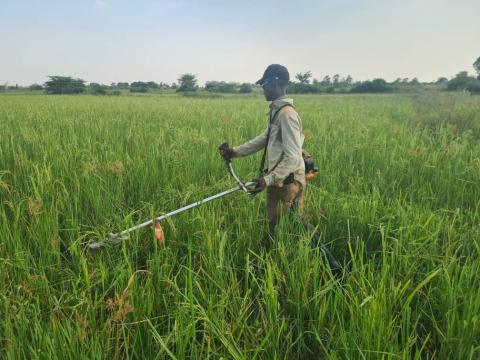AUTHORITIES CRACK DOWN ON WETLAND ENCROACHERS IN SOROTI DISTRICT
AUTHORITIES CRACK DOWN ON WETLAND ENCROACHERS IN SOROTI DISTRICT
The Soroti District authorities have ordered individuals cultivating crops in wetlands to vacate the areas by the end of the year or face legal action. This directive aims to curb rampant wetland encroachment and restore these vital ecosystems.
Encroachers are currently harvesting crops such as rice, sugarcane, tomatoes, and cabbages in wetlands located in Gweri, Aukot, Oculoi, Arapai, Lale, Ocokican, and parts of Kamuda Sub-County. Despite repeated warnings, wetland degradation in the district has continued unabated.
The Soroti District Natural Resources Committee, in collaboration with the District Security Committee, last week escalated their efforts by cutting rice and sugarcane planted in the wetlands as a demonstration of their resolve.
Resident District Commissioner (RDC) Paul Eseru emphasized that the encroachers must leave and cease planting for the next season.
“We are implementing the president’s directive to push encroachers out of wetlands, as seen elsewhere in the country. Leaders at all levels must sensitize the public about the dangers of wetland degradation,” Eseru stated.
He warned that, individuals planning to establish gardens in wetland areas would face strict legal action if found in violation.
Environmental Impact of Encroachment
Sam Peter Echengu, the Soroti District Environment Officer in charge of wetlands, expressed concern over the alarming rate of wetland encroachment. He revealed that approximately 70% of swamps and grazing areas in the district have been converted for agriculture and settlements, primarily for rice, sugarcane and vegetable cultivation.
“This encroachment has significantly contributed to erratic weather patterns, including droughts, floods, and irregular rainfall, which negatively impact agricultural production across the Teso region,” Echengu explained.
According to Echengu, many residents claim ancestral rights to the wetlands, asserting that their forebears also used these areas for farming. However, he clarified that wetlands are best suited for controlled activities such as fish farming along the peripheries, not large-scale agriculture or settlements.
Enforcement and Legal Framework
“We are determined to reclaim these wetlands. Those who refuse to leave will be arrested and prosecuted,” Echengu warned, citing provisions in the National Environment Act.
Section 36 of the Act prohibits wetland reclamation, illegal structures, and other activities that degrade these ecosystems. It empowers local authorities to demolish unauthorized structures and manage wetlands within their jurisdictions.
Echengu urged residents to respect the law and vacate within the grace period to allow for the rejuvenation of these critical ecosystems.
A Call to Action
District authorities have appealed to community leaders and residents to cooperate in the conservation efforts.
“We must act collectively to protect our wetlands,” Eseru emphasized, noting that sustainable wetland management is crucial for mitigating climate change impacts and ensuring long-term agricultural productivity.
The enforcement measures are expected to intensify if encroachers fail to comply by the end of the year, signaling a firm stance by Soroti authorities to preserve the district’s natural resources.
By Abraham Ekwaru, the District Communication Officer, Soroti


